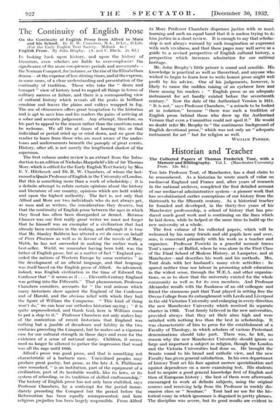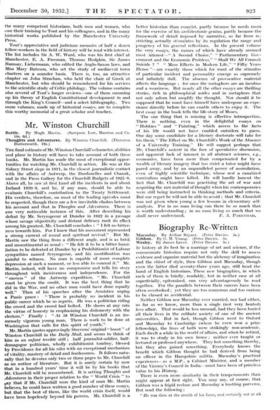Historian and Teacher
THE late Professor Tout, of Manchester, has a dual claim to be remembered. As a historian he wrote much of value on mediaeval England and France and, after years of research in the national archives, completed the first detailed account of our mediaeval administrative system—a pioneer work that has revolutionized earlier conceptions of our history from the thirteenth to the fifteenth century. As a historical teacher he founded and developed, in the thirty-five years of his Manchester professorship, a school of history that has pro- duced much good work and is continuing on the lines which he laid down, while he helped at the same time to build up the new university at a whole.
The first volume of his collected papers, which will be welcomed by his many friends and old pupils here and over- seas, is concerned primarily with his work as a teacher and organizer. Professor Powicki in a graceful memoir traces Tout's career—at Balliol, where he was alone in the First Class of the Final School of Modern History, at Lampeter, and at Manchester—and describes his work and his methods. Mrs. Tout deals with her husband's many civic activities : he spared neither time nor labour in promoting adult education in the widest sense, through the W.E.A. and other organiza; tions, so as to show that the university existed for the whole community as well as for its own members. And Professor Alexander recalls with the frankness of an old colleague and friend the strenuous part that Tout played in setting free the Owens College from its entanglement with Leeds and Liverpool in the old Victorian University and enlarging in every direction the new Manchester University which received its separate charter in 1903. Tout firmly believed in the new universities, provided always that they set their aims high and were satisfied with nothing less thari the best in scholarship. It was characteristic of him to press for the establishment of a Faculty of Theology, in which scholars of various Protestant denominations should take part. There was, he felt, no reason why the new Manchester University should ignore so large and important a subject as religion, though the London and the Victoria Universities had done so. He brought the Senate round to his broad and catholic view, and the new Faculty has given general satisfaction. In his own department of history Tout set his face against narrow specialization and against dependence on a mere examining test. His students had to acquire a good general knowledge first of English and then of European history ; the best Of them were afterwards encouraged to work at definite subjects, using the original sources and receiving help from the Professor in weekly dis- cussion class or " Seminar." Tout had no use for the his- torical essay in which ignorance is disguised in pretty phrases. The discipline was severe, but its good results are evident in
the many competent historians, both men and women, who owe their training to Tout and his colleagues, and in the many historical works published by the Manchester University Press.
Tout's appreciative and judicious memoirs of half a dozen fellow-workers in the field of history will be read with interest. The list includes Sir A. W. Ward, who was his first chief at Manchester, E. A. Freeman, Thomas Hodgkin, Sir James Ramsay, Lieberman, who edited the Anglo-Saxon laws, and Miss Mary Bateson, who set the study of mediaeval town charters on a sounder basis. There is, too, an attractive chapter on John Strachan, who held the chair of Greek at Manchester, but who should be remembered for his services to the scientific study of Celtic philology. The volume contains also several of Tout's longer reviews—one of them summing up his theory of English Constitutional development in and through the King's Council—and a select bibliography. Two more volumes, made up of historical essays, are to complete this worthy memorial of a great scholar and teacher.































 Previous page
Previous page